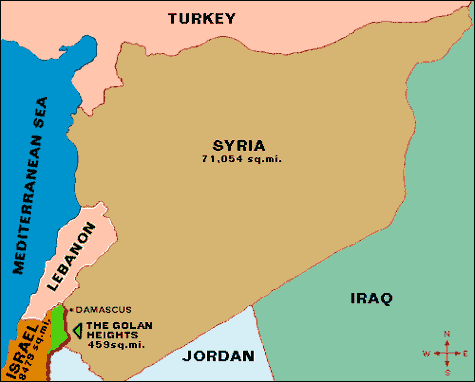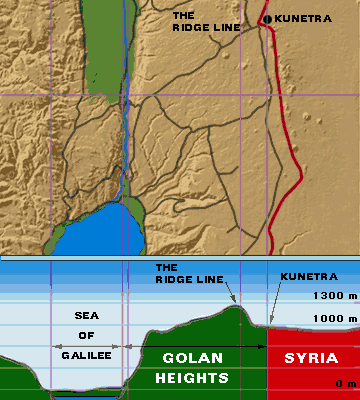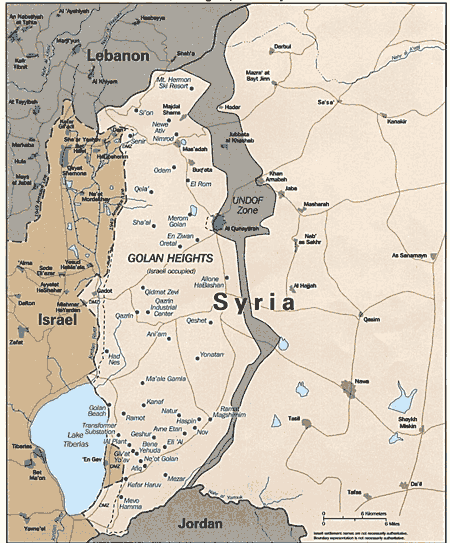The Golan Heights
by Mitchell Bard

From the western Golan, it is only about 60 miles -- without major terrain obstacles -- to Haifa and Acre, Israel's industrial heartland. The Golan -- rising from 400 to 1700 feet in the western section bordering on pre1967 Israel -- overlooks the Huleh Valley, Israel's richest agricultural area. In the hands of a friendly neighbor, the escarpment has little military importance. If controlled by a hostile country, however, the Golan has the potential to again become a strategic nightmare for Israel.
From 1948-67, when Syria controlled the Golan Heights, it used the area as a military stronghold from which its troops randomly sniped at Israeli civilians in the Huleh Valley below, forcing children living on kibbutzim to sleep in bomb shelters. In addition, many roads in northern Israel could be crossed only after probing by mine-detection vehicles. In late 1966, a youth was blown to pieces by a mine while playing football near the Lebanon border. In some cases, attacks were carried out by Yasir Arafat's Fatah, which Syria allowed to operate from its territory.
Israel's options for countering the Syrian attacks were constrained by the geography of the Heights. "Counterbattery fires were limited by the lack of observation from the Huleh Valley; air attacks were degraded by well-dug-in Syrian positions with strong overhead cover, and a ground attack against the positions...would require major forces with the attendant risks of heavy casualties and severe political repercussions," U.S. Army Col. (Ret.) Irving Heymont observed.

Israel repeatedly, and unsuccessfully, protested the Syrian bombardments to the UN Mixed Armistice Commission, which was charged with policing the cease-fire. For example, Israel went to the UN in October 1966 to demand a halt to the Fatah attacks. The response from Damascus was defiant. "It is not our duty to stop them, but to encourage and strengthen them," the Syrian ambassador responded. Nothing was done to stop Syria's aggression. A mild Security Council resolution expressing "regret" for such incidents was vetoed by the Soviet Union. Meanwhile, Israel was condemned by the UN when it retaliated. "As far as the Security Council was officially concerned," historian Netanel Lorch wrote, "there was an open season for killing Israelis on their own territory."
After the Six-Day War began, the Syrian air force attempted to bomb oil refineries in Haifa. While Israel was fighting in the Sinai and West Bank, Syrian artillery bombarded Israeli forces in the eastern Galilee, and armored units fired on villages in the Huleh Valley below the Golan Heights.
On June 9, 1967, Israel moved against Syrian forces on the Golan. By late afternoon, June 10, Israel was in complete control of the plateau. Israel's seizure of the strategic heights occurred only after 19 years of provocation from Syria, and after unsuccessful efforts to get the international community to act against the aggressors.
Six years later, in a surprise attack on Yom Kippur, the Syrians overran the Golan Heights before being repulsed by Israeli counterattacks. After the war, Syria signed a disengagement agreement that left the Golan in Israel's hands. [See map]
On December 14, 1981, the Knesset voted to annex the Golan Heights. The statute extended Israeli civilian law and administration to the residents of the Golan, replacing the military authority that had ruled the area since 1967.
Since 1974, Syria has adhered to the cease-fire on the Golan, largely because of the presence of Israeli troops within artillery range of Damascus. But during this time, Syria has provided a haven and supported numerous terrorist groups that attack Israel from Lebanon and other countries. These include the Democratic Front for the Liberation of Palestine (DFLP); the Popular Front for the Liberation of Palestine (PFLP), Hezbollah and the Popular Front for the Liberation of PalestineGeneral Command (PFLPGC). In addition, Syria still deploys hundreds of thousands of troops-as much as 75 percent of its army-on the Israeli front near the Heights.
As the peace process faltered in 1996-97, Syria began to renew threats of war with Israel and to make threatening troop movements. Some Israeli analysts have warned of the possibility of a lightning strike by Syrian forces aimed at retaking the Golan. The Israeli Defense Forces have countered the Syrian moves; however, and -- to this point -- preserved the peace.
Prospects for Peace
For Israel, relinquishing the Golan to a hostile Syria could jeopardize its early-warning system against surprise attack. Israel has built radars on Mt. Hermon, the highest point in the region. If Israel withdrew from the Golan and had to relocate these facilities to the lowlands of the Galilee, they would lose much of their strategic effectiveness.
One possible compromise might be a partial Israeli withdrawal, along the lines of its 1974 disengagement agreement with Syria. Another would be a complete withdrawal, with the Golan becoming a demilitarized zone.
After losing the 1999 election, Benjamin Netanyahu confirmed reports that he had engaged in secret talks with Syrian President Hafez Assad to withdraw from the Golan and maintain a strategic early-warning station on Mount Hermon. Publicly, Assad continued to insist on a total withdrawal with no compromises and indicated no willingness to go beyond agreeing to a far more limited "nonbelligerency" deal with Israel than the full peace treaty Israel has demanded.
The election of Ehud Barak stimulated new movement in the peace process, with intensive negotiations held in the United States in January 2000 between Barak and Syrian Foreign Minister Farouk al-Sharaa. These talks raised new hope for the conclusion of a peace treaty, but the discussions did not bear fruit. President Assad died in June 2000 and no further talks have been held as Assad's son and successor, Bashar has moved to consolidate his power. Rhetorically, Bashar has not indicated any shift in Syria's position on the Golan.
Israeli Settlements in the Golan Heights (February 1992)

Press reports suggest Israel has expressed a willingness to withdraw from a significant part of the Golan Heights if it can get from Syria security guarantees and normal relations.
In an interview with the Israeli Defense Ministry’s monthly Bitachon, Deputy Defense Minister Ephraim Sneh said the topographical concerns associated with withdrawing from the Golan Heights could be offset by demilitarization. "Our red line needs to be a defensible border," Sneh said, "a border where the chief of General Staff can come to the government or the Knesset Foreign Affairs and Defense Committee and say: ‘From this line I can defend the State of Israel with minimum losses.’" Sneh added, "the deeper the demilitarization and the better the early warning, the more we will allow ourselves to be flexible topographically." Sneh also emphasized that Israel could not compromise on water sources.
Besides military security, a key to peace with Syria, Sneh said, would be the normalization of relations between the two countries. "When an Israeli thinks of normalization he wants to get up in the morning and take his wife and kids on a shopping trip to Damascus and come home," Sneh said. "The Syrians see normalization as an exchange of ambassadors and flight links – maximum. We need to demand that it be a peace warmer than with Egypt, closer to the type of peace we have with Jordan."
In the meantime, substantial opposition exists within Israel to withdrawing from the Golan Heights. The expectation of many is that public opinion will shift if and when the Syrians sign an agreement and take measures, such as reigning in Hezbollah attacks on Israel from southern Lebanon, that demonstrate a genuine interest in peace. And public opinion will determine whether a treaty is concluded because Barak has said any agreement must be approved in a national referendum (a law to this effect was passed under Netanyahu).
Absent dramatic changes in Syria's government and its attitude toward Israel; however, the Jewish State's security will depend on its retention of military control over the Golan Heights.